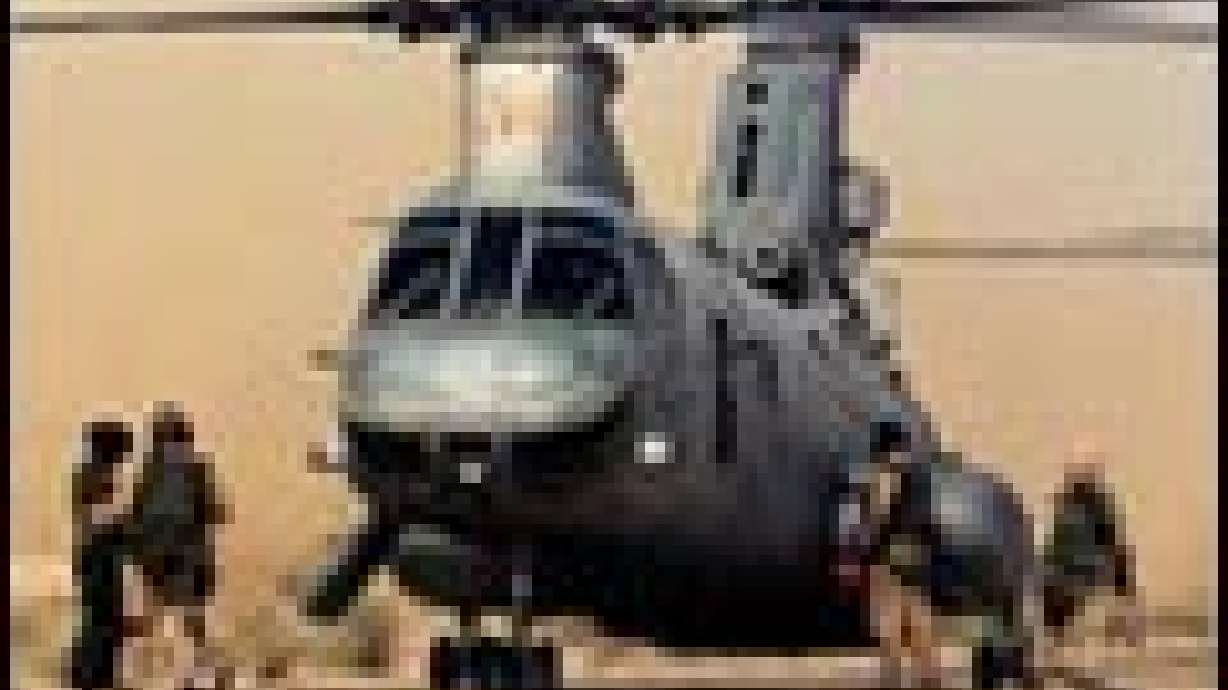Estimated read time: 4-5 minutes
This archived news story is available only for your personal, non-commercial use. Information in the story may be outdated or superseded by additional information. Reading or replaying the story in its archived form does not constitute a republication of the story.
WASHINGTON (AP) -- U.S.-led forces were airlifting soldiers of an Iraqi exile group into southern Iraq to serve as humanitarian liaison officers and help root out Saddam Hussein's paramilitary among the population, the group said Sunday.
The first of more than 1,000 expected, some 700 soldiers of the Iraqi National Congress were near the city of Nasiriyah, the group said. The city was brought under control of the U.S.-led invasion force only a few days ago after a two-week battle by U.S. Marines, defense officials have said.
Marines have been reaching out to the population there, and can be helped by Iraqi exiles who know the language and population, said Riva Levinson, consultant and spokeswoman for the INC in Washington.
She said in a telephone interview that they will help with the distribution of humanitarian aid as well as help "root out pro-Saddam elements" such as paramilitary fighters from the Fedayeen, Saddam's Ba'ath Party and others who have put up stiff resistance to coalition forces and reportedly prevented some Iraqi fighters from surrendering.
"They are only lightly armed, some have military training and others do not," Levinson said of the new infusion of coalition soldiers. "But they have a familiarity with Iraqi society and can be a bridge between coalition forces and the civilian population."
Iraqi "freedom fighters" will also form the nucleus of a new national army for that country, U.S. Marine Corps Gen. Peter Pace said Sunday.
Less than 100 others trained by the Pentagon in Hungary went into Iraq earlier to do liaison jobs with U.S.-led forces. It was not immediately clear how the new group was organized and why it did not go through the same training.
"These are Iraqi citizens who want to fight for a free Iraq, who will become basically the core of the new Iraqi army once Iraq is free," Pace, vice chairman of the joint chiefs of staff, said on ABC's "This Week."
"We are proud to contribute our forces," Ahmad Chalabi of the INC said in a statement Sunday from Nasiriyah.
"The war of national liberation which Iraqis have waged for 30 years is now nearing its end. We call on the Iraqi people to join with us in removing the final remnants of Saddam's Baathist regime."
Pace differed on the number of troops already in Iraq, saying it was smaller than 500 as of Sunday morning but growing every day. Pentagon officials were unable to clarify the number.
Asked if the participation of soldiers from the Iraqi National Congress would give that group an unfair advantage in the process of setting up a new government for Iraq, Pace said the Iraqis are volunteers "from all over," including expatriates arriving from the United States.
"The fact that they may be from one section of the population or another at this point in time on the battlefield is not significant," he said.
"I'm comfortable that once we free Iraq and give it to the people in Iraq, that they will be able to decide for themselves who should be their leaders and who should not," Pace said.
Earlier, Deputy Defense Secretary Paul Wolfowitz also stressed the necessity of the Iraqi people deciding on their future.
"We can't say that anyone should take a leading role," he said. "By definition, if you're going to have a government, or even a transitional authority, that represents the legitimate views of the Iraqi people, its the Iraqi people that have to decide."
Pace said coalition forces are continuing to isolate Baghdad as U.S. officials envision more "pinpoint missions" such as the quick in-and-out raid inside the Baghdad city limits to demonstrate American military might and flush out Iraqi defenses.
Meanwhile, U.S. troops were moving to encircle the Iraqi capital with armored vehicles, choking off reinforcements or escape for Saddam Hussein's troops and supporters.
As fighting continuing elsewhere in Iraq, attention remained focused on Baghdad, with a strategy aimed at avoiding door-to-door urban warfare that could cause high civilian casualties.
In northern Iraq, a Kurdish party spokesman said U.S. aircraft bombed a joint convoy of Kurdish fighters and U.S. Special Forces, killing at least 12 Kurdish fighters and injuring at least 45 others. A BBC reporter traveling with the convoy said it included between eight and 10 cars, two of which carried U.S. Special Forces troops. Correspondent John Simpson, who was wounded in the leg by shrapnel, said he counted at least 10 bodies amid the burning vehicles.
(Copyright 2003 by The Associated Press. All Rights Reserved.)









